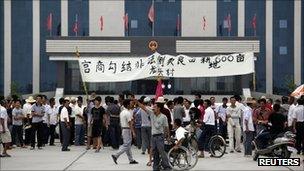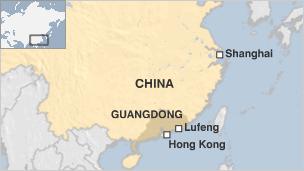Protesters riot in China city over land sale
- Published

Some protests are still continuing - and the banner accused officials of stealing farmland
Protests have taken place in a Chinese city for a third day, after two days of reported rioting over a land sale.
Officials said protesters in Lufeng city injured police officers and damaged government buildings during the unrest that began on Wednesday.
A reporter for Reuters news agency who visited Lufeng on Friday said protests had continued at government offices.
There are tens of thousands of protests each year in China, some of which turn violent.
Many are triggered by local grievances, such as farmers being expelled from their land to make way for development.
'Ulterior motives'
One media report said several thousand people had taken part in the violence earlier this week in Wukan village, which is part of Lufeng city, in Guangdong province.
According to the South China Morning Post, protesters targeted a Communist Party building, a police station and an industrial park, amongst others.
They believe that local party officials have sold their land to developers, the daily said.

Images on internet forums showed villagers marching with a banner that read: "Return my ancestral farmland".
Local officials said only a few hundred people had been involved.
In a statement, they said that while a land deal had been the initial trigger, rumours that police had killed a child sparked further anger.
"On 22 September at about one in the afternoon, some villagers who had ulterior motives spread rumours about police killing a child, inciting some of the villagers to storm a border police station," the statement said.
Local officials said 12 officers had been wounded and six police cars burnt. Residents said a number of protesters had also been hurt, the South China Morning Post reported.
A Reuters reporter who visited Lufeng on Friday said several hundred people were still protesting outside government offices, calling for their land to be returned.
"We are very angry because we have no land for our livelihood anymore," one farmer was quoted as saying.
The scene was tense but there was no violence, the agency reported. Protesters had used motorbikes to block roads and broken bricks were piled up.
Searches for the word Lufeng on micro-blogging sites were reportedly being blocked.
Stability fears
There are hundreds of protests in China every week, says the BBC's Michael Bristow in Beijing.
Some are small in scale and centre on local grievances, but certain issues keep cropping up.
One often-heard complaint is that corrupt officials collude with developers to sell off farmland without giving farmers the proper compensation.
Laws are in place to protect farmers, but are often ignored at local level.
Earlier this year, addressing the opening of the National People's Congress, Premier Wen Jiabao warned that if China wanted to ensure social stability it had to tackle corruption and address economic inequalities.
- Published14 August 2011
- Published14 June 2011
- Published5 March 2011